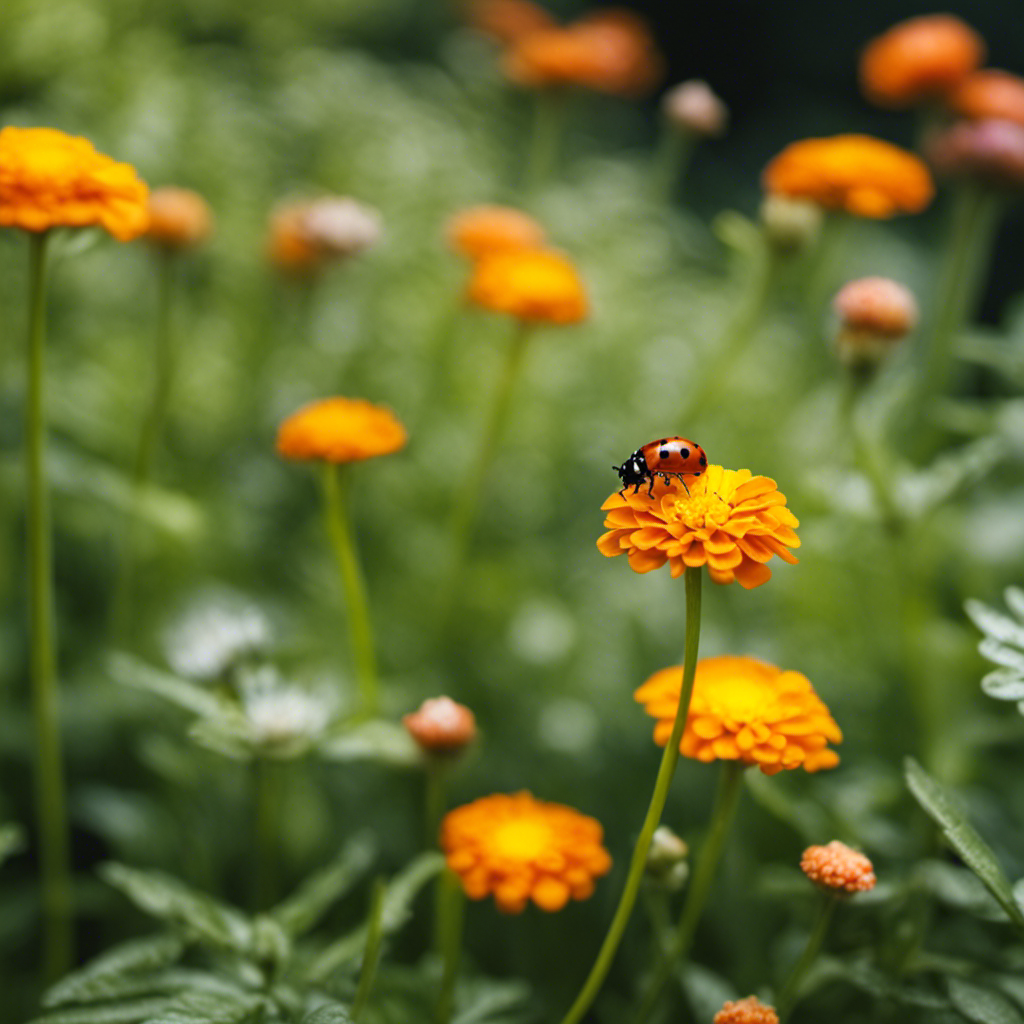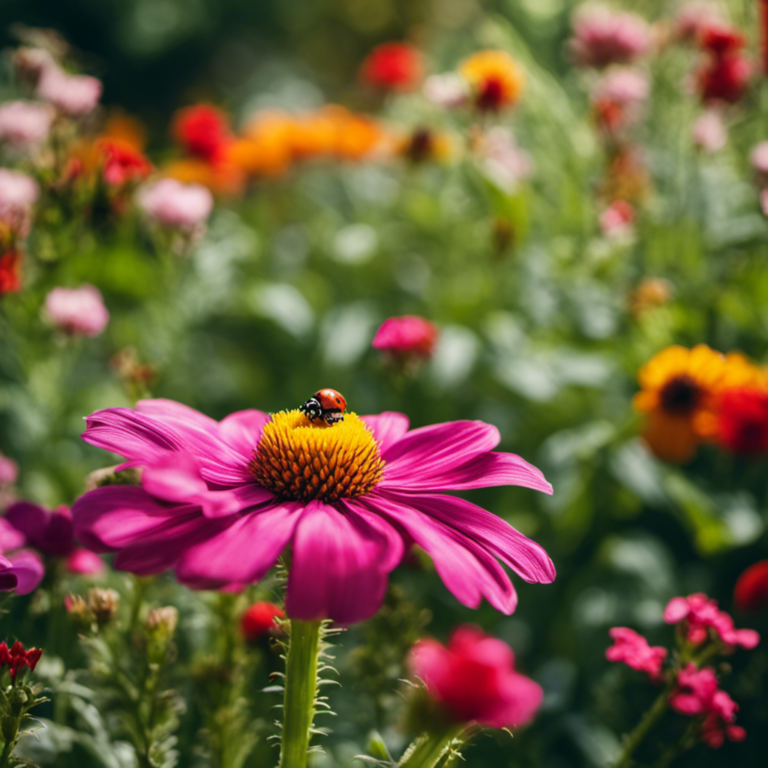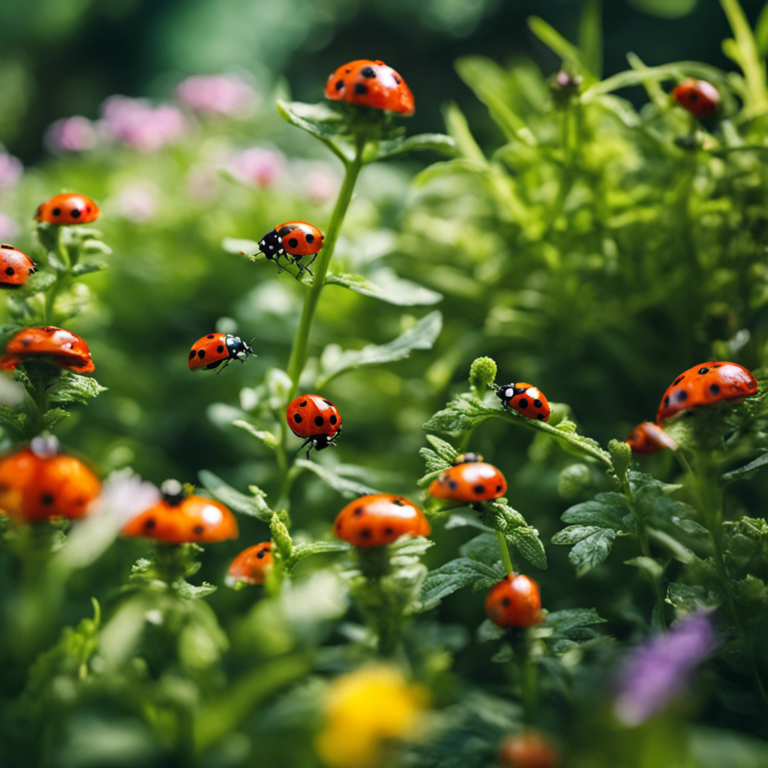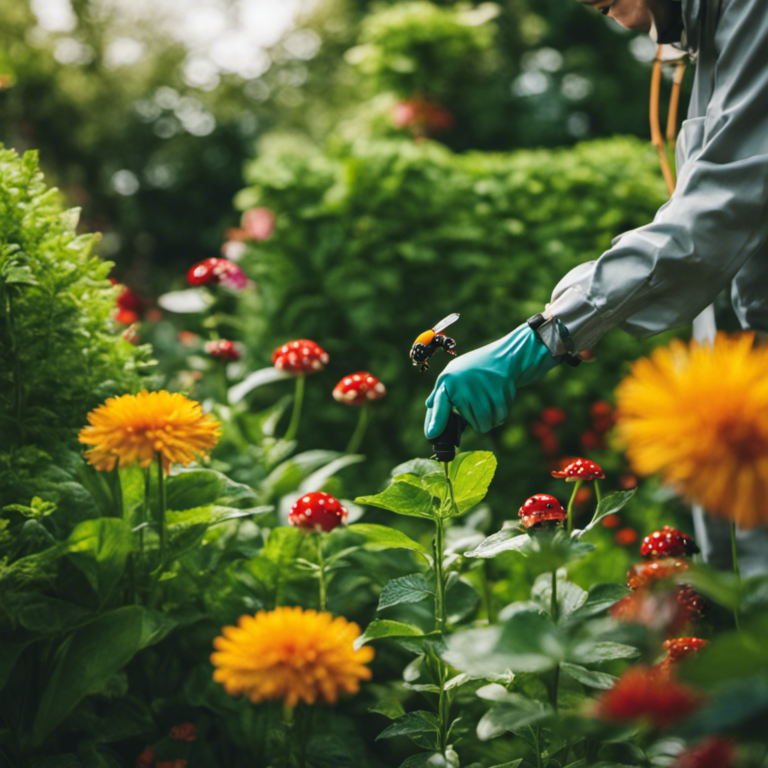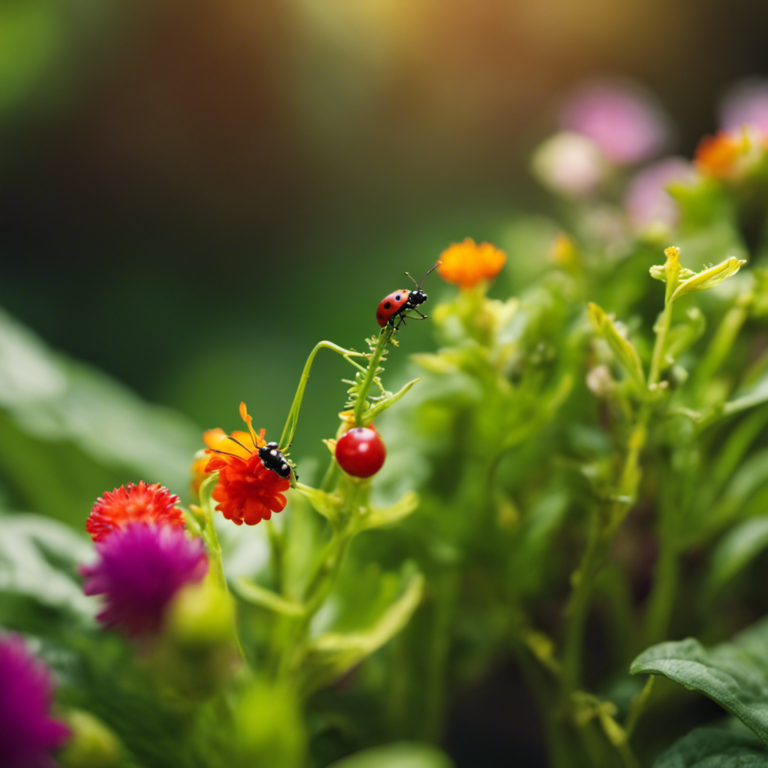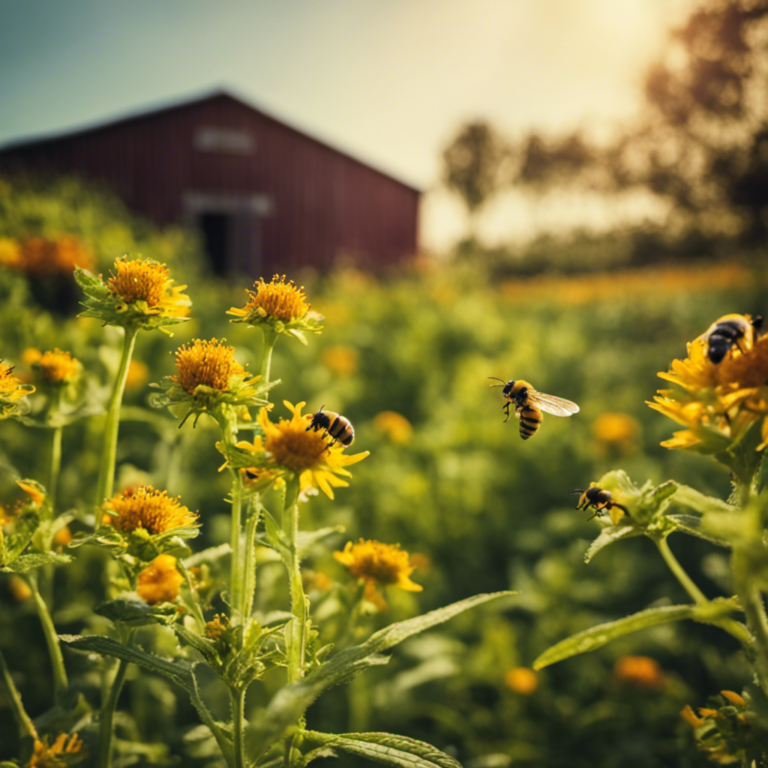Are pests causing problems in your herb garden? Look no further! This article provides 13 unique homegrown remedies for controlling pests in your herb garden.
From using neem oil spray to creating a garlic pest repellent, these practical solutions will help you protect your valuable herbs.
Imagine having a garden filled with vibrant and pest-free plants, all thanks to these effective and natural remedies.
Bid farewell to harmful chemicals and say hello to a thriving herb garden. Let’s begin exploring these solutions!
Key Takeaways
Now equipped with these 13 homemade remedies for controlling pests in your herb garden, you can naturally and effectively protect your plants. Did you know that marigolds emit a scent that repels harmful insects? Imagine creating a beautiful border of marigolds around your herb garden, acting as a natural barrier against pests. With these practical solutions, you can maintain a thriving herb garden without resorting to harmful chemicals.
Neem Oil Spray
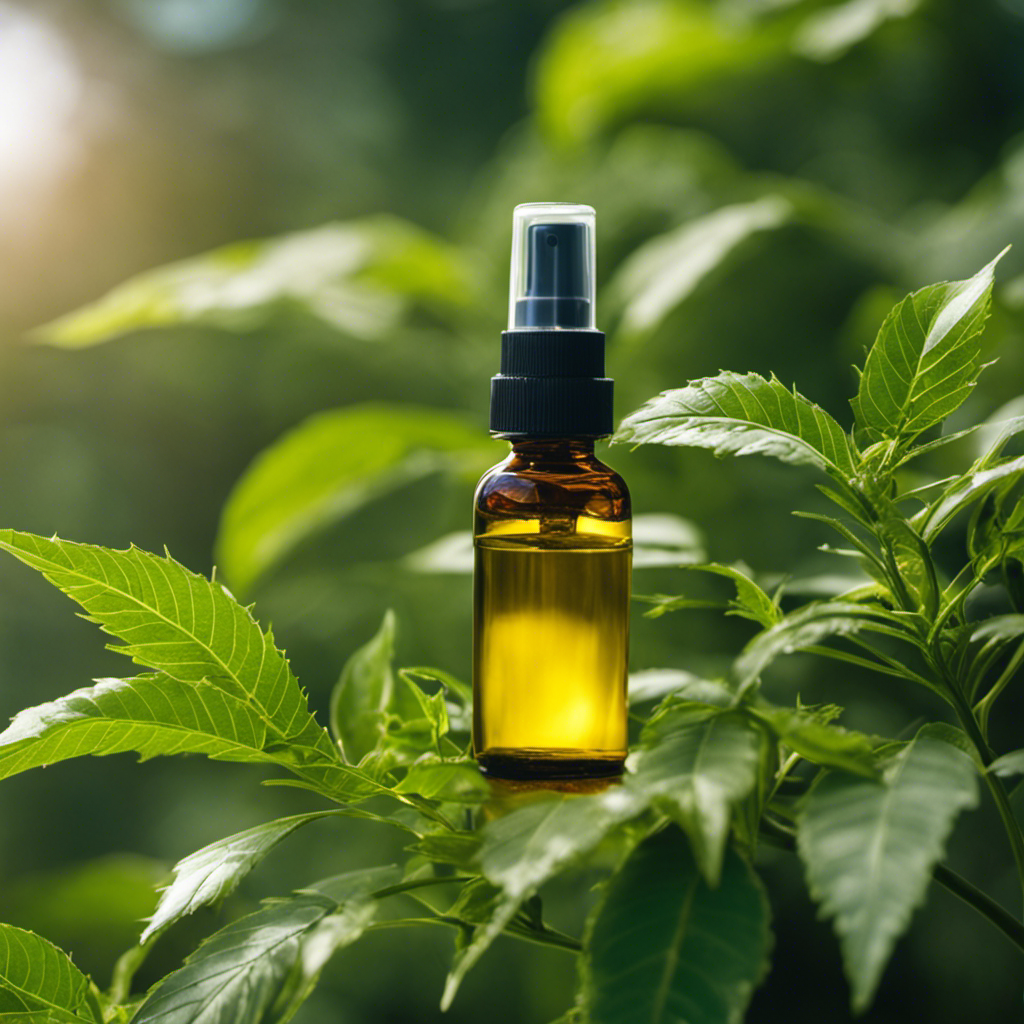
Control pests on your herb plants effectively with the use of neem oil spray.
Neem oil, which is derived from the neem tree, offers a range of benefits for natural pest control. It contains compounds that repel insects, disrupt their feeding and reproductive processes, and even inhibit their growth. By spraying your herb plants with neem oil, you can protect them from various pests such as aphids, whiteflies, and spider mites.
Neem oil not only repels these pests but also acts as a deterrent, preventing them from laying eggs and causing further damage to your plants. Moreover, neem oil has antimicrobial properties that can help safeguard your herbs from fungal infections.
To make a neem oil spray, simply mix one teaspoon of neem oil with a few drops of dish soap and a quart of water. Apply the solution to your herb plants, ensuring that both the tops and undersides of the leaves are covered. Repeat this process every 7-14 days or as necessary to keep pests at bay.
Garlic Pest Repellent
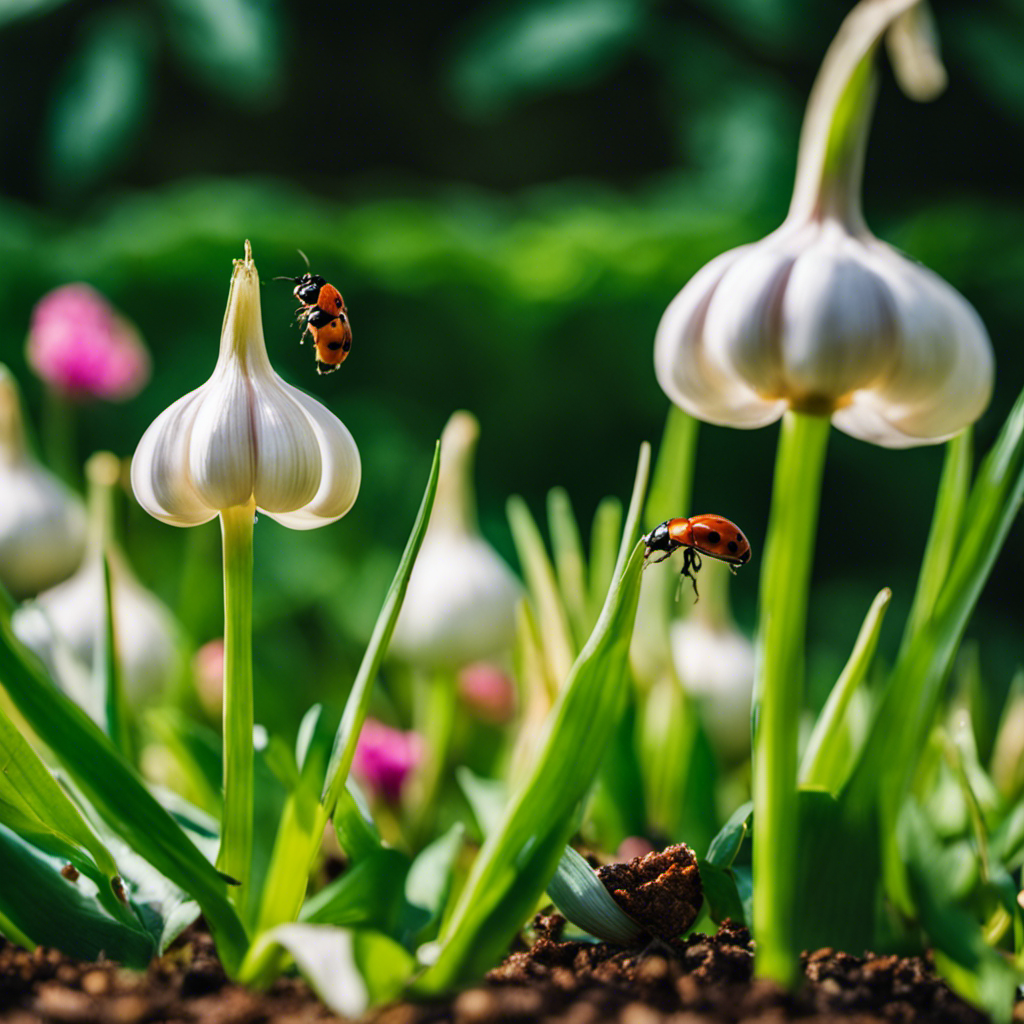
Protecting your herb plants from pests can be done naturally by using garlic as a pest repellent. Garlic has been used for centuries to deter insects due to its strong smell and potent properties.
One effective method is to create garlic infused oil. Simply crush several cloves of garlic and mix them with a carrier oil like vegetable or olive oil. Let the mixture sit for a day or two, then strain it to remove any solid particles. Dilute the garlic infused oil with water and spray it directly on the leaves and stems of your herb plants.
Another option is to make a garlic water spray by blending several cloves of garlic with water and straining the mixture. Spray this garlic water on your plants to keep pests away. Remember to reapply the repellent after rain or as needed.
Soap and Water Solution
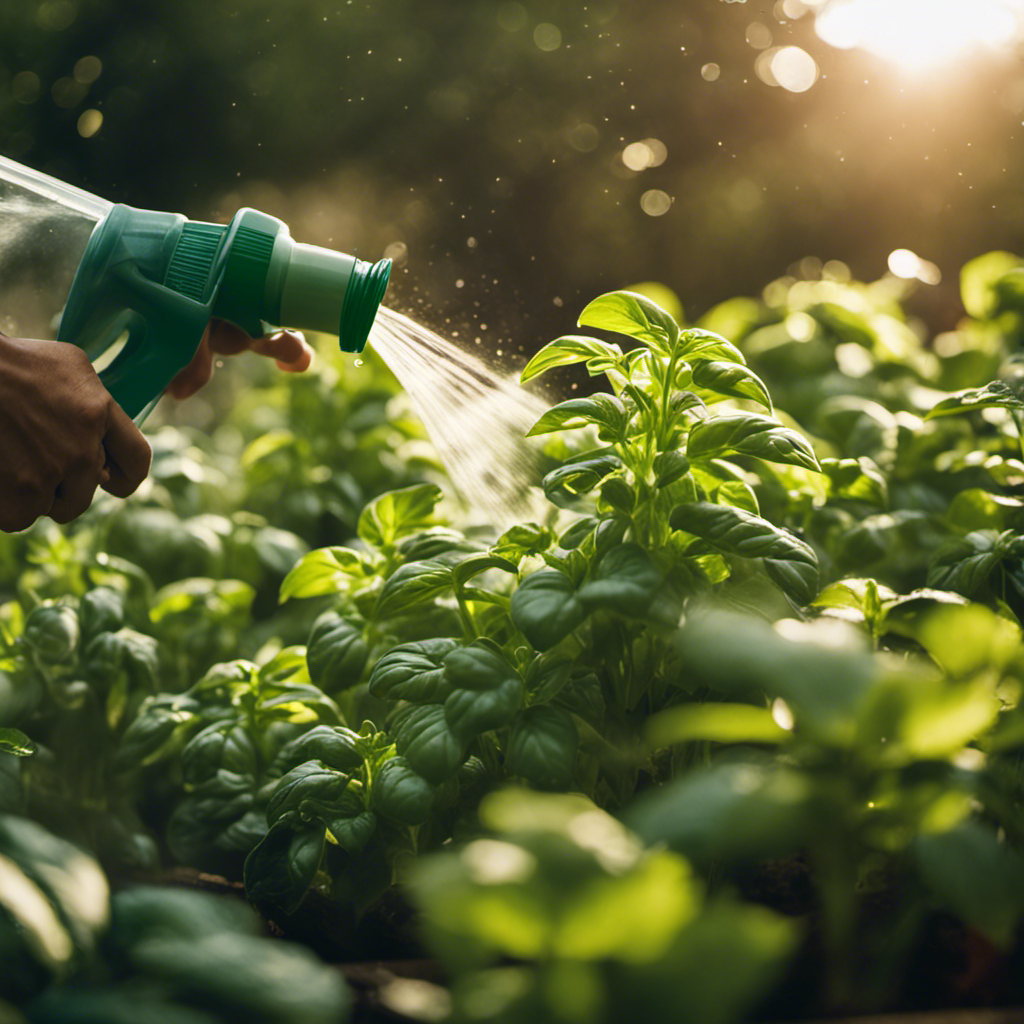
Create a powerful solution for controlling herb pests by mixing soap and water. This simple and effective method can protect your herbs from unwanted invaders.
Here’s how you can make and use the soap and water mixture:
-
Combine one gallon of water with one tablespoon of liquid soap (preferably biodegradable). Stir well to ensure thorough mixing.
-
Transfer the soap and water solution into a spray bottle or a garden sprayer.
-
Spray the mixture directly onto the leaves and stems of the affected herbs, making sure to cover all areas.
The soap acts as a natural insecticide, suffocating the pests and preventing them from damaging your herbs. Remember to reapply the solution after rainfall or heavy watering.
For added effectiveness, you can also consider adding a small amount of vinegar to the soap and water mixture. Vinegar acts as a pesticide and can help repel certain herb pests.
Companion Planting
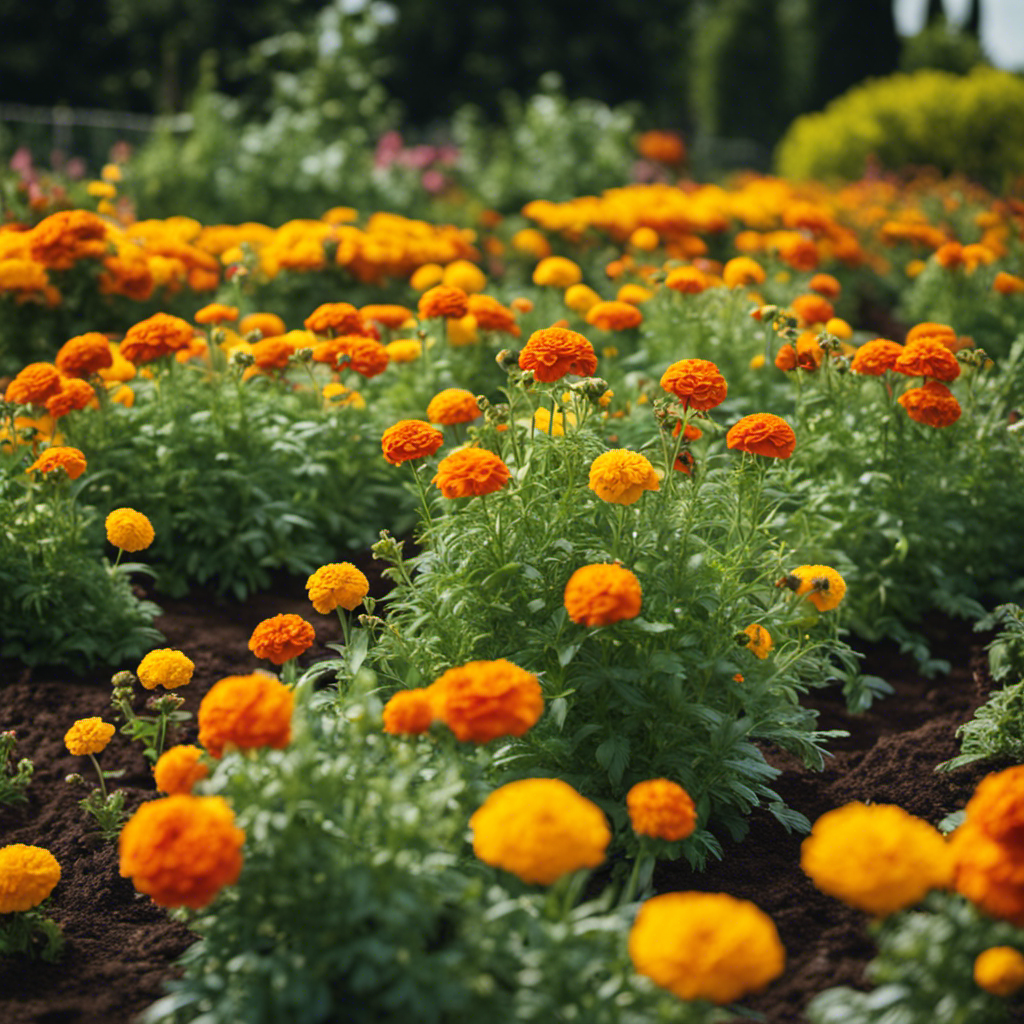
Looking to naturally control pests in your herb garden?
Companion planting is a technique that involves growing certain plants together to repel pests and promote healthy growth.
By strategically selecting plant combinations, you can create a natural pest control system that benefits your herbs.
Some popular pairings include marigolds with tomatoes to deter nematodes, and basil with tomatoes to repel aphids.
Explore the world of companion planting to discover successful plant pairings for your herb garden.
Pest-Repelling Plant Combinations
Enhance the natural defenses of your herb garden against pests by strategically pairing pest-repelling plants for effective companion planting. By combining specific plants, you can create a natural barrier that deters pests and promotes the overall health of your herbs. Consider the following plant combinations for optimal pest control:
-
Basil and tomatoes: Planting basil alongside your tomato plants can help repel insects such as aphids and spider mites. The strong aroma of basil acts as a natural deterrent, keeping pests away from your tomatoes.
-
Marigolds and herbs: Marigolds are renowned for their ability to repel a wide range of pests, including nematodes and whiteflies. Planting marigolds around your herb garden can provide protection for your herbs against these common pests.
-
Nasturtiums and cucumbers: Nasturtiums not only add a vibrant touch to your garden but also repel pests like aphids and squash bugs. Planting nasturtiums near your cucumber plants can help keep these destructive pests at bay.
Benefits of Companion Planting
Benefits of Companion Planting
Pairing pest-repelling plants in your herb garden not only promotes the overall health of your herbs but also offers numerous benefits through companion planting.
Companion planting benefits your herb garden in several ways. First, it helps control pests effectively. By planting certain herbs and flowers together, you can naturally deter pests that can damage your herbs. For example, planting marigolds alongside your herbs can repel aphids and other harmful insects.
Second, companion planting can enhance the flavor and fragrance of your herbs. Some plants, when grown together, can improve the taste and aroma of herbs, making them more flavorful in your cooking.
Lastly, companion planting can improve pollination and increase yields. By attracting pollinators like bees and butterflies, companion plants can help your herbs produce more flowers and fruits.
Successful Plant Pairings
Promoting the overall health of your herbs and effectively controlling pests in your garden can be achieved through the use of plant pairings in companion planting. Plant pairings involve strategically planting specific herbs or flowers together to maximize their benefits and deter pests.
Let’s explore three successful examples of plant pairings:
-
Basil and tomatoes: Planting basil near your tomato plants can repel pests such as whiteflies, aphids, and tomato hornworms. Not only that, but basil also enhances the flavor of tomatoes when used together in recipes.
-
Marigolds and beans: Marigolds release a scent that repels pests like nematodes, aphids, and bean beetles. By planting marigolds alongside your bean plants, you can protect them from these destructive insects.
-
Dill and cabbage: Intercropping dill with cabbage can attract beneficial insects like ladybugs and lacewings. These insects feed on cabbage worms and aphids, helping to control pests and maintain the health of your cabbage plants.
Citrus Peels Deterrent
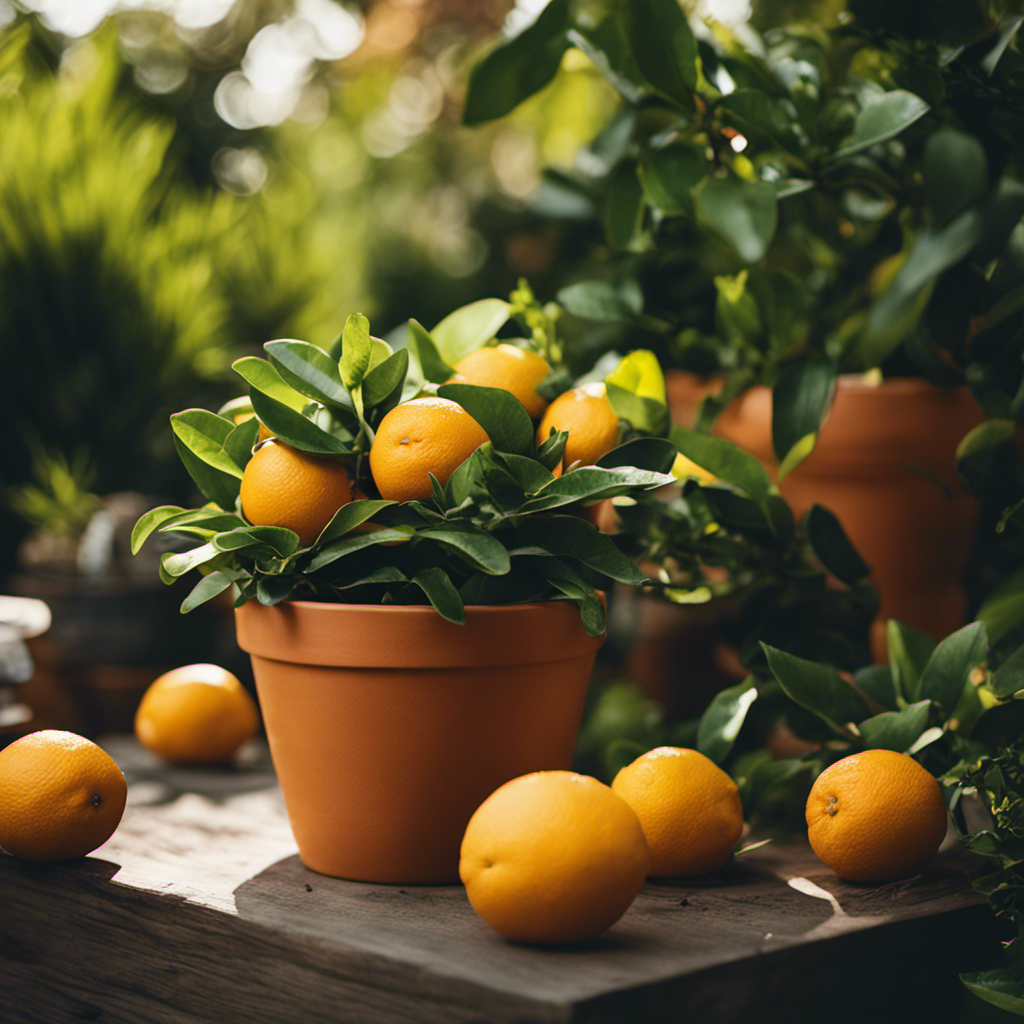
Looking for a natural way to keep pests away from your herb garden? Consider using citrus peels as a deterrent.
Citrus peels can effectively repel unwanted insects and critters. Simply scatter or place citrus peels around your garden to create a natural barrier that pests don’t enjoy.
It’s a simple and effective solution to protect your herbs from pests without the need for harmful chemicals.
Natural Citrus Pest Deterrent
How can you effectively use citrus peels as a natural pest deterrent for your herb garden?
Citrus peels contain natural compounds that repel pests, making them a great choice for keeping your herbs safe and healthy. Here’s an easy homemade citrus spray recipe to help deter pests:
- Collect citrus peels from lemons, oranges, or grapefruits.
- Chop the peels into small pieces and place them in a jar.
- Pour boiling water over the peels and let them steep overnight.
- Strain the liquid into a spray bottle and discard the peels.
- Spray the citrus-infused water onto your herb plants, focusing on the leaves and stems.
- Reapply the spray every few days or after rainfall to maintain its effectiveness.
Using this natural lemon deterrent will help keep pests away without the need for harmful chemicals. Give it a try and enjoy a thriving herb garden!
Effective Citrus Peel Remedy
Protect your herb garden from pests with a simple and effective remedy using citrus peels. Not only are citrus peels a delicious addition to your meals, but they can also be used as a natural alternative for pest control.
To make this homemade repellent, gather citrus peels from oranges, lemons, or grapefruits. Chop the peels into small pieces and scatter them around your herb garden. The strong scent of the citrus peels acts as a deterrent to pests, keeping them away from your valuable herbs.
In addition, the oils in the peels can repel insects like aphids and ants. This method isn’t only highly effective but also environmentally friendly, making it an excellent choice for those who want to protect their herb garden while being mindful of the planet.
Hot Pepper Spray
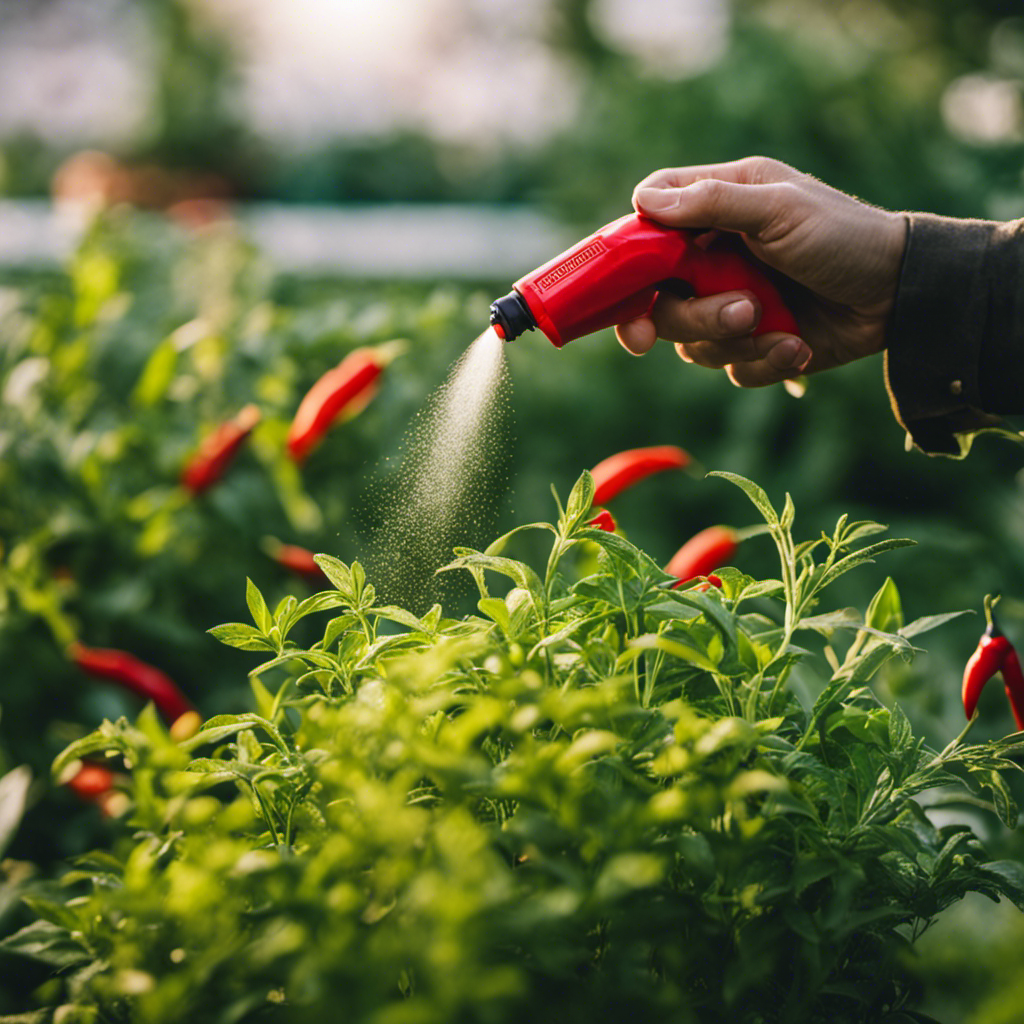
Make your own homemade hot pepper spray to effectively control pests in your herb garden. Hot pepper spray is a natural and eco-friendly method that utilizes the power of hot peppers to repel insects and other pests. Creating your own hot pepper spray is simple and cost-effective.
Here’s a step-by-step guide to making your own hot pepper spray:
-
Gather the necessary ingredients: You’ll need hot peppers, water, liquid dish soap, and a spray bottle.
-
Prepare the hot pepper mixture: Start by chopping the hot peppers into small pieces and placing them in a blender. Add water to the blender and blend until you have a smooth liquid.
-
Strain and add dish soap: Strain the liquid to remove any solids or seeds from the mixture. Then, add a few drops of liquid dish soap to the pepper mixture and mix well. The dish soap helps the spray adhere to the plants.
-
Transfer to a spray bottle and apply: Carefully transfer the hot pepper spray into a spray bottle. When applying the spray, make sure to generously coat the leaves and stems of your herb plants.
Hot pepper spray works by emitting a strong scent and taste that repels pests. It provides an effective defense against insects and other garden pests, safeguarding your herbs and promoting a thriving garden.
Remember to reapply the hot pepper spray after rainfall or as needed to maintain its effectiveness. With your homemade hot pepper spray, you can protect your herb garden and enjoy the benefits of a pest-free environment.
Diatomaceous Earth Application
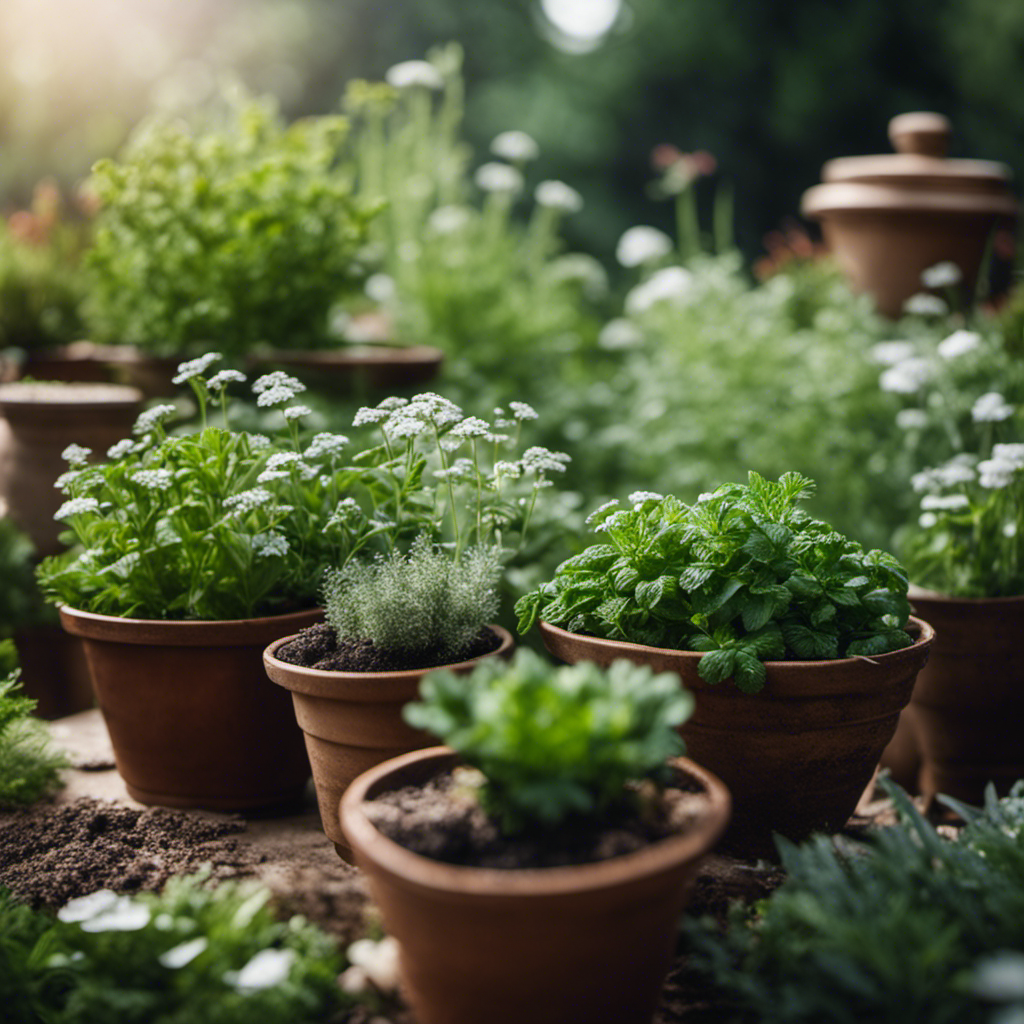
Diatomaceous Earth for Effective Pest Control in Your Herb Garden
When it comes to controlling pests in your herb garden, diatomaceous earth can be a valuable tool. This natural substance is made from the fossilized remains of tiny aquatic organisms called diatoms. It works by physically damaging the exoskeletons of insects, leading to their dehydration and eventual death.
One of the key benefits of using diatomaceous earth is its non-toxic nature. Unlike chemical pesticides, it’s safe for humans, animals, and the environment. This makes it an ideal choice for organic gardening practices. Additionally, diatomaceous earth is effective against a wide range of pests, including ants, beetles, slugs, and aphids.
However, it’s important to use diatomaceous earth cautiously. While it’s generally safe for plants, excessive application or use on delicate foliage can cause damage. It’s always best to follow the product instructions and apply it sparingly, targeting the areas where pest activity is high.
Effective Pest Control
To effectively control pests on your herbs, a great option is to use diatomaceous earth. This natural substance is derived from the fossilized remains of diatoms, tiny aquatic organisms. When pests come into contact with diatomaceous earth, it damages their outer shell, leading to dehydration and eventual death.
Here are three reasons why diatomaceous earth is an excellent choice for pest control on your herbs:
-
Non-toxic: Unlike chemical pesticides, diatomaceous earth is safe for both humans and pets. It provides an organic and environmentally friendly solution for pest control.
-
Long-lasting: Once applied, diatomaceous earth remains effective for an extended period. It can continue safeguarding your herbs from pests for weeks, even in wet weather conditions.
-
Versatile: Diatomaceous earth can be used to combat various pests, including aphids, caterpillars, slugs, and snails. You can apply it directly to the leaves of your plants or sprinkle it around the base of your herbs.
Benefits of Diatomaceous Earth
Using diatomaceous earth for pest control in your herb garden can be even more effective when combined with other natural remedies. Diatomaceous earth is a powdery substance made from fossilized algae called diatoms. It’s a popular choice among gardeners due to its ability to keep pests away.
When applied to the soil, diatomaceous earth acts as a physical barrier, preventing pests from reaching your herbs. It also has abrasive properties that can dehydrate and kill insects by damaging their exoskeletons. To use diatomaceous earth, simply sprinkle a thin, even layer around the base of your herb plants. Remember to reapply after heavy watering or rainfall to maintain its effectiveness.
Benefits of Diatomaceous Earth for Your Herb Garden
Here are some advantages of using diatomaceous earth for pest control in your herb garden:
- Natural and Non-Toxic: Diatomaceous earth is safe to use around pets, children, and beneficial insects.
- Effective Against a Wide Range of Pests: It can help control aphids, slugs, snails, beetles, and other common garden pests.
- Long-Lasting Protection: Once applied, diatomaceous earth remains effective for an extended period, providing continuous pest control.
- Improves Soil Health: In addition to pest control, diatomaceous earth can improve drainage and aeration, promoting healthier and more productive herbs.
- Environmentally Friendly: Diatomaceous earth is a sustainable and eco-friendly option for pest control in your garden.
Safe for Plants?
Is Diatomaceous Earth Safe for Plants?
If you’re using diatomaceous earth for pest control in your herb garden, you might be wondering if it’s safe for your plants. The good news is that when used correctly, diatomaceous earth is generally safe for plants. Here are a few things to keep in mind:
-
Avoid applying diatomaceous earth directly to the foliage of your plants, as it can cause damage. Instead, apply it around the base of the plants or sprinkle it on the soil.
-
Be cautious when using homemade herb pest control remedies in general. Some homemade remedies may contain ingredients that can harm your plants or disrupt their growth.
-
If you’re looking for alternative methods for pest control that are safe for plants, consider using neem oil, insecticidal soaps, or companion planting. These methods can effectively control pests without causing harm to your precious herbs.
Essential Oil Insecticide
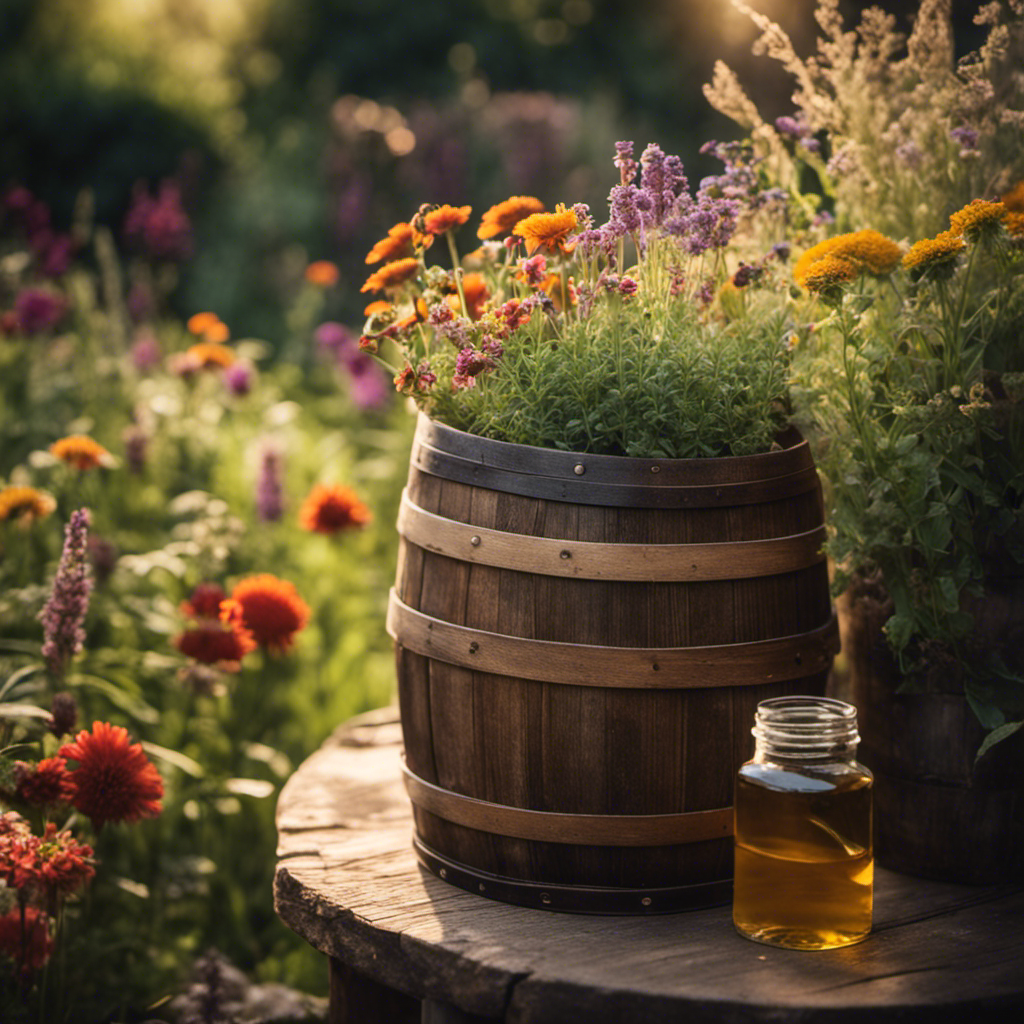
Using essential oils as an insecticide can effectively control pests in your herb garden. Not only do essential oils provide a natural and safe alternative to chemical pesticides, but they also offer additional aromatherapy benefits.
Certain essential oils, like peppermint, lavender, and citronella, have strong scents that repel insects such as aphids, ants, and mosquitoes. To make your own essential oil blend, simply mix a few drops of your chosen oils with water in a spray bottle. Shake well and then spray the mixture onto your herbs, focusing on the leaves and stems where pests tend to gather.
Remember to reapply the essential oil insecticide after rainfall or every few days for maximum effectiveness. This method isn’t only practical but also serves as a natural way to protect your herb garden from pests while enjoying the therapeutic benefits of essential oils.
Vinegar Herb Spray
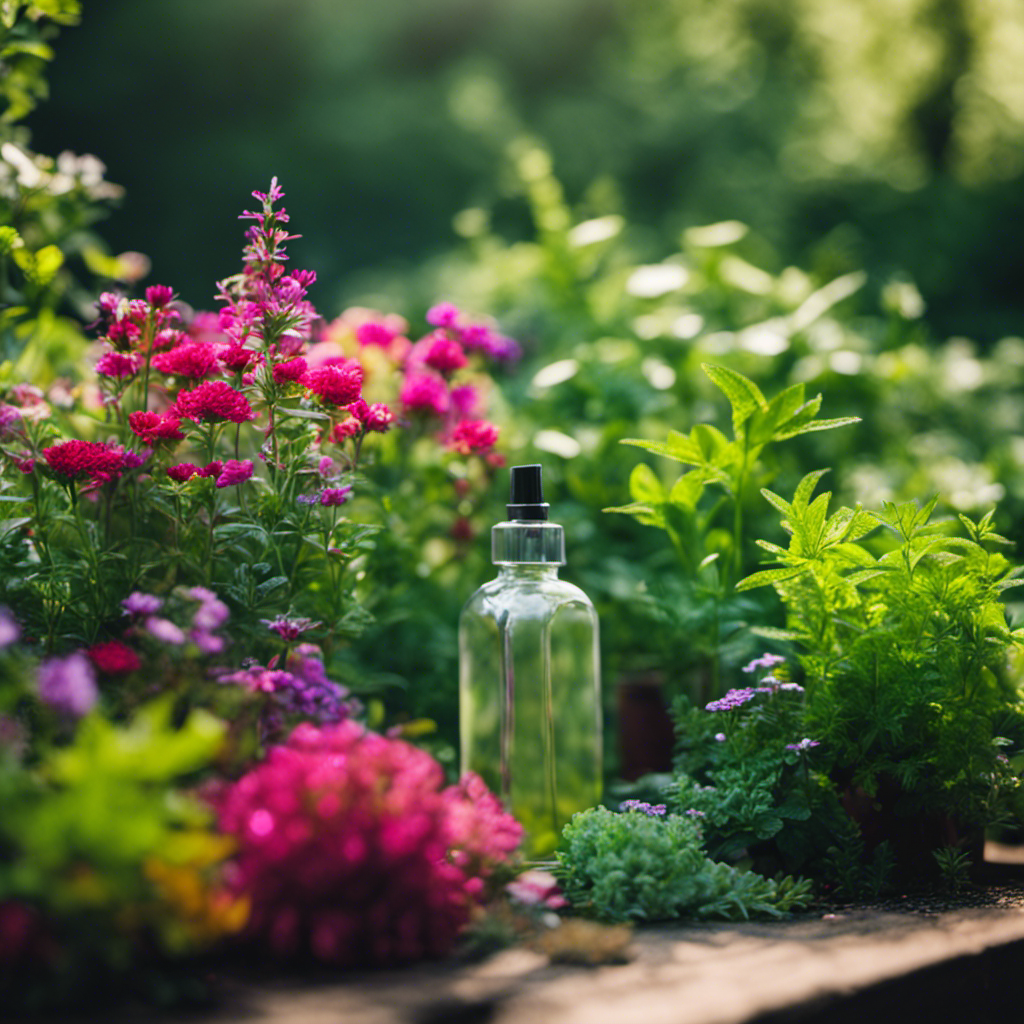
If you want to continue protecting your herb garden from pests, consider using a vinegar herb spray. This natural remedy isn’t only effective but also safe for the environment, your herbs, and yourself.
Unlike chemical-based pesticides, vinegar herb spray doesn’t harm beneficial insects or contaminate the soil. It’s a versatile and cost-effective solution that can be used on a wide range of herbs and plants.
Vinegar is readily available in most households and mixing it with water in a spray bottle creates a simple and easy-to-use solution. Just spray it directly on your herbs and the surrounding soil, repeating every few days or after rainfall for optimal results.
Coffee Ground Barrier
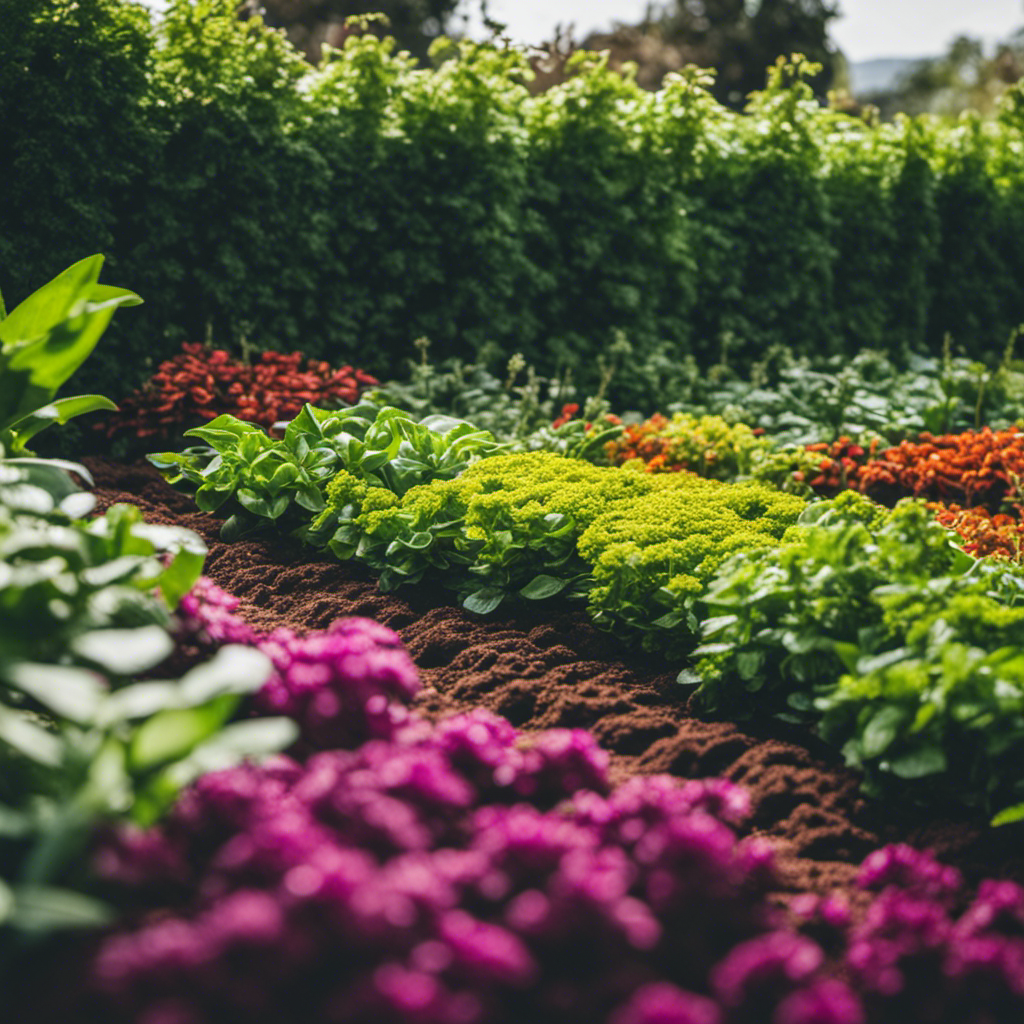
To create a simple and effective barrier against pests in your herb garden, consider using coffee grounds.
Coffee grounds have various uses beyond your morning cup of coffee. One of these uses is repelling pests and protecting your precious herbs. All you need to do is sprinkle the coffee grounds around the base of your herb plants to create a natural barrier. The strong aroma of coffee acts as a deterrent for insects and slugs, keeping them away from your herbs.
Not only does this method help with pest control, but it also enriches the soil with nutrients like nitrogen, potassium, and magnesium, acting as a natural fertilizer.
This organic pest control technique isn’t only effective but also environmentally friendly. So, the next time you brew your coffee, don’t throw away those grounds. Instead, repurpose them to give your herbs the protection they deserve.
Beer Slug Trap
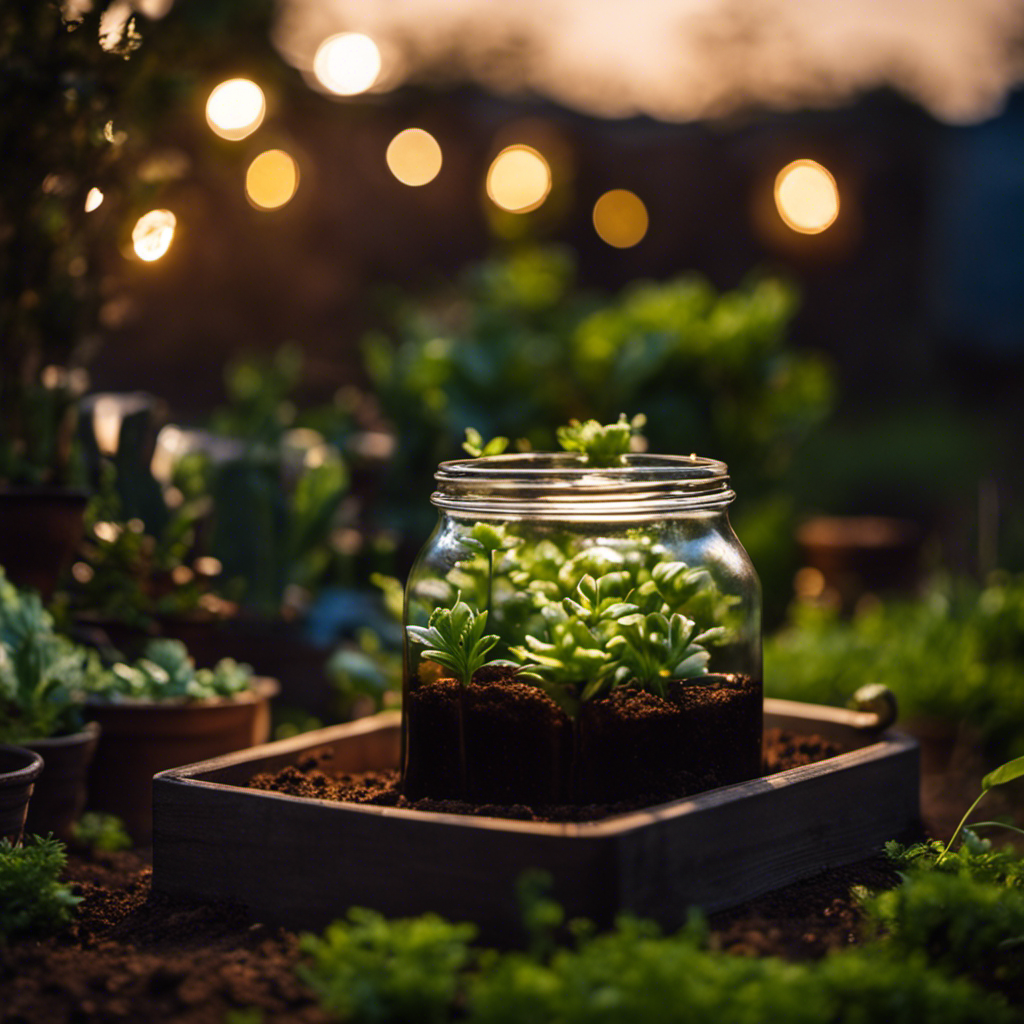
Protecting your herbs from pests is essential for their health and vitality. One effective method is setting up a beer slug trap in your garden. Slugs and snails can cause significant damage to your herbs, but with this simple trap, you can eliminate them naturally.
Here’s how to set up a beer slug trap:
- Find a shallow container such as a yogurt cup or a small dish.
- Bury the container in the ground, ensuring the rim is at ground level.
- Fill the container with beer, which will attract the slugs.
- Slugs will crawl into the container and drown in the beer.
Remember to empty and refill the trap regularly to maintain its effectiveness. This beer slug trap provides a natural and efficient solution to control slug populations in your garden, safeguarding your precious herbs.
In addition to the beer slug trap, you can also make a garlic pest repellent to further protect your herbs. Simply crush a few cloves of garlic and mix them with water. Spray this mixture on your plants to deter pests such as aphids and caterpillars.
Marigold Border
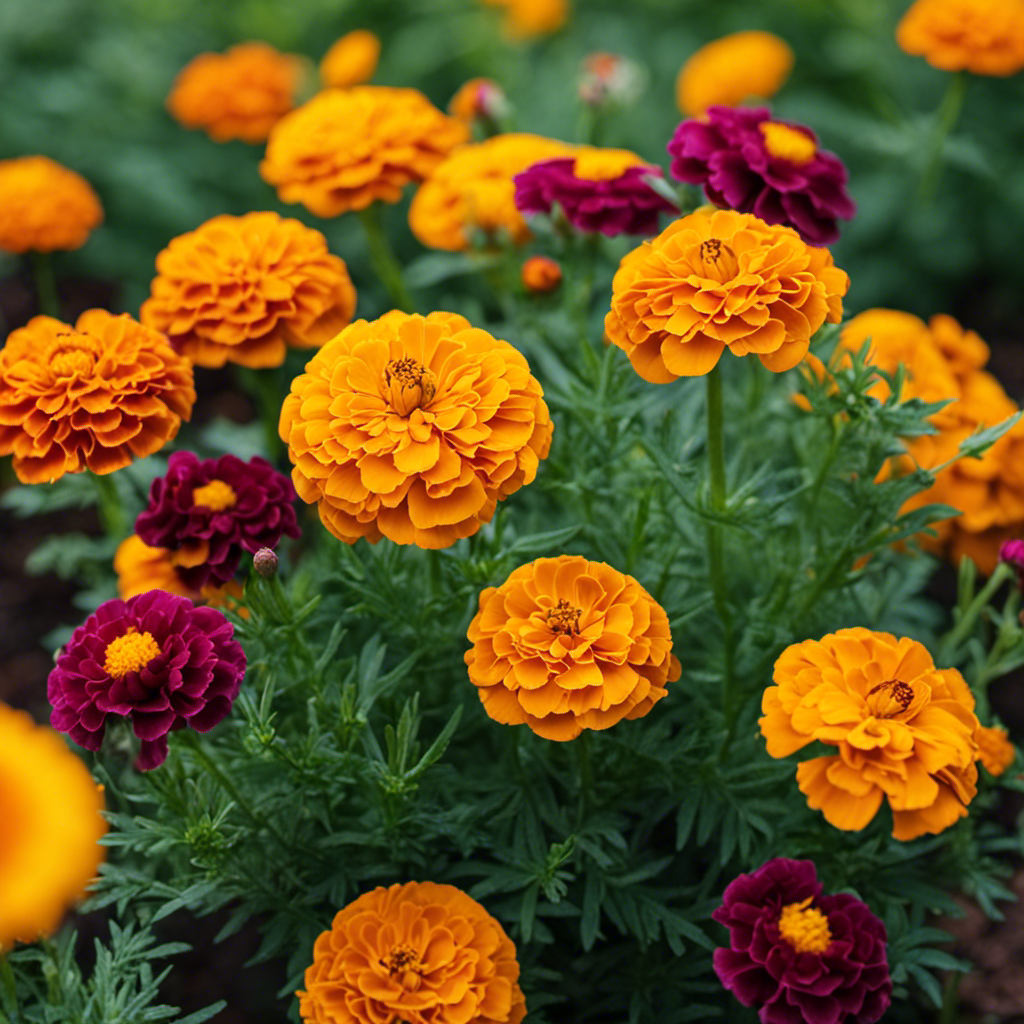
Create a marigold border around your herb garden to naturally repel pests and improve the health of your plants. Marigolds aren’t only beautiful and vibrant, but they also offer numerous benefits when it comes to pest control. These colorful flowers emit a strong scent that repels insects and pests, acting as a natural deterrent. Additionally, marigolds release chemicals into the soil that help to fend off nematodes, which are microscopic worms that can damage the roots of your herbs. By planting marigolds around your herb garden, you can create a protective barrier that keeps pests away and promotes the overall well-being of your plants. Consider incorporating marigolds into your garden layout to enjoy the benefits of natural pest control.
Marigold Benefits:
- Vibrant and colorful: Marigolds add a pop of color to your garden, enhancing its beauty.
- Strong scent: The strong fragrance of marigolds acts as a deterrent to insects and pests.
- Releases chemicals: Marigolds release chemicals into the soil that help fend off nematodes, protecting the roots of your herbs.
- Promotes plant health: By repelling pests and deterring nematodes, marigolds contribute to the overall health of your plants.
- Enhances garden beauty: The vibrant blooms of marigolds add visual appeal to your herb garden.
Homemade Insecticidal Soap
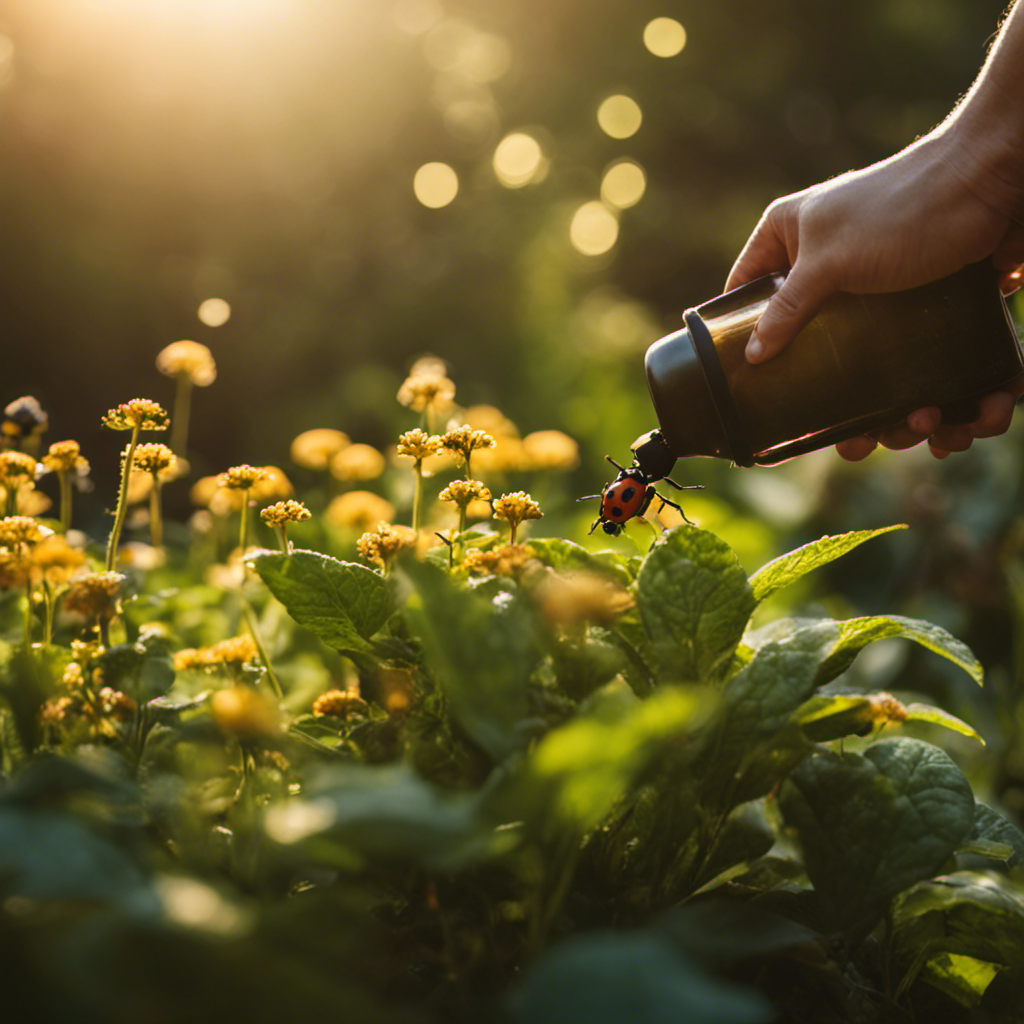
Making your own insecticidal soap is a highly effective and eco-friendly method for controlling herb pests. Homemade soap recipes can be easily crafted using common household ingredients, providing a fantastic alternative to chemical insecticides found in stores.
Let’s explore three key benefits of using natural insecticides:
-
Safe for plants: Homemade insecticidal soap is gentle on plants, making it a suitable option for protecting your herbs without causing any harm to them.
-
Non-toxic: Unlike chemical insecticides, homemade insecticidal soap doesn’t contain harmful toxins that can pose a danger to humans and pets. It offers a safe and non-toxic solution for pest control in your herb garden.
-
Cost-effective: Creating your own insecticidal soap is a budget-friendly choice when compared to purchasing commercial insecticides. By making your own, you can save money while still effectively managing herb pests.
Conclusion
Now armed with these 13 unique homemade remedies for controlling pests in your herb garden, you can protect your plants naturally and effectively.
Did you know that marigolds emit a scent that repels harmful insects? Imagine creating a beautiful border of marigolds around your herb garden, acting as a natural barrier against pests.
With these practical solutions, you can maintain a thriving herb garden without resorting to harmful chemicals.
